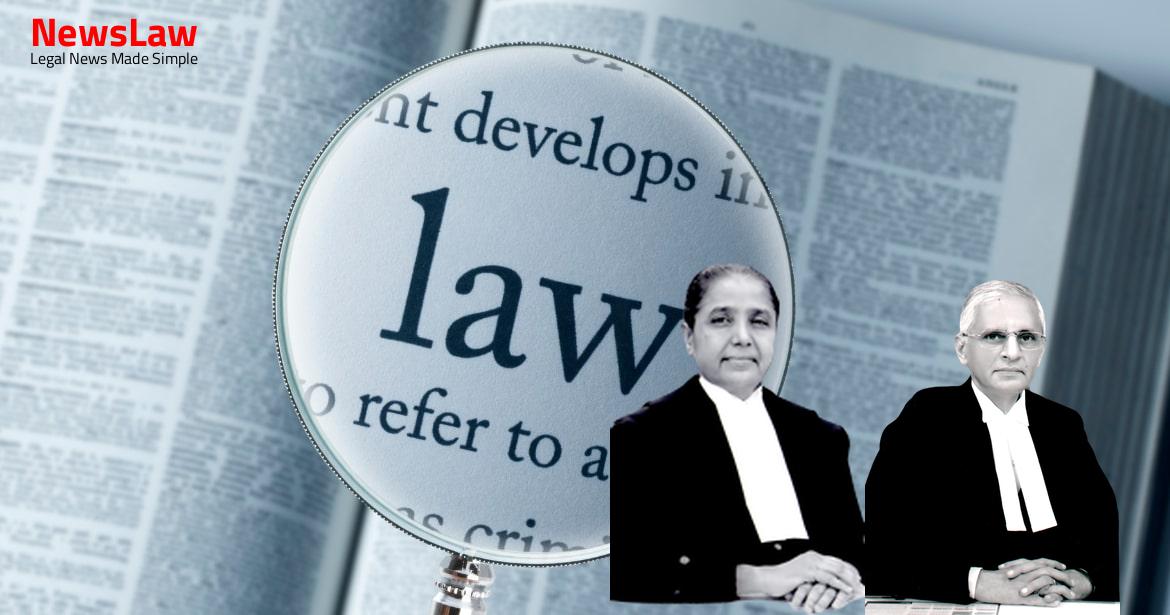The court’s legal analysis in this case highlights the importance of judicial discretion in ordering police investigations, particularly in cases involving sexual harassment and assault. The focus is on ensuring a fair and compassionate approach towards victims, without burdening them with unnecessary procedures. The court’s emphasis on following the law and meeting the ends of justice sets a significant precedent for future cases.
Facts
- Appellant filed complaint against second respondent for inappropriate behavior in March 2019
- Lodged complaint at Police Station Gole Ka Mandir on 14 October 2019
- Moved Judicial Magistrate First Class under Section 156(3) of the CrPC
- DVRs of audio-video recording were sought but found unavailable due to theft
- In-charge Vice-Chancellor alleged sealed packet of DVRs handed over to second respondent
- Second respondent directed to produce DVRs of CCTV cameras for investigation
- Internal Complaints Committee found allegations against second respondent established
- Second respondent lodged an appeal against findings of ICC
- The High Court held that the JMFC had the discretion to direct the complainant to examine witnesses under Sections 200 and 202 CrPC instead of directing an investigation under Section 156(3) CrPC.
- The High Court also noted that the JMFC could still opt to seek an investigation by the police at a later stage by directing an inquiry under Section 202 CrPC.
- Despite the JMFC’s discretion, it concluded that the occurrence of the offense by the accused persons was prima facie shown.
- The JMFC treated the complaint as a complaint case and allowed the appellant to be present for the recording of her statements under Sections 200 and 202 CrPC.
- The appellant challenged the JMFC’s order under Section 482 CrPC, which was subsequently dismissed by a Single Judge of the High Court on 6 January 2022.
Also Read: Balancing Power and Transparency: Electoral Bonds Struck Down, Disclosure Mandated
Analysis
- The discretion granted to the Magistrate under Section 156(3) of CrPC must be exercised judiciously, considering the inability of the complainant to gather crucial evidence.
- In cases of sexual harassment and assault, it is crucial for courts to ensure a fair investigation and not further burden the complainant.
- Police officers have a duty to register an FIR when a cognizable offence is disclosed in a complaint, and they cannot decline to do so.
- The decision to order a police investigation under Section 156(3) of CrPC should be guided by judicial reasoning and not exercised arbitrarily.
- In situations where there is evidence in the possession of the accused or others that the police could investigate, the matter should be referred to the police for investigation.
- The High Court held that the JMFC was not obligated to direct the police to register the FIR, as the use of ‘may’ in Section 156(3) CrPC indicated discretion.
- A division bench in Sakiri Vasu v. State of U.P. elaborated on the Magistrate’s powers under Section 156(3) and emphasized the need to meet the ends of justice.
- Courts must treat victims sensitively in cases of sexual harassment and assault, ensuring the process is not burdensome for victims.
- Aggrieved persons should not have to struggle unnecessarily for the registration of a complaint in cases of cognizable offences.
- Legislation has been shaped to empower victims of sexual crimes to seek justice in a sensitive manner.
- The Magistrate may direct police to investigate when a cognizable offence is evident from the complaint.
- Special centers have been directed to be set up to facilitate depositions by vulnerable witnesses, like victims of sexual offences.
- Cross-examination of the aggrieved woman should be conducted respectfully and without inappropriate questions about her sexual history.
- The complete truth must be brought on record to facilitate adjudication while treating the victim sensitively.
- It is the duty of the police to act in a public-spirited manner, especially when dealing with victims of crimes.
- Trial courts are responsible for handling aggrieved persons appropriately, including conducting proceedings in camera when necessary.
- The Court has not expressed any opinion on the allegations in the complaint.
Also Read: Recall of Resolution Plan Approval: Legal Analysis
Decision
- The appeal has been allowed as per the terms mentioned.
- Any pending applications have been disposed of.
- The investigating officer is directed to investigate the allegations within the framework of the law.
Case Title: XYZ Vs. THE STATE OF MADHYA PRADESH (2022 INSC 799)
Case Number: Crl.A. No.-001184-001184 / 2022



